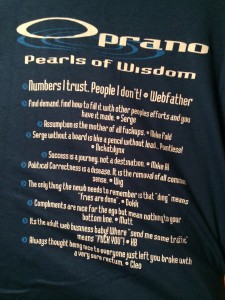Morning Folks!!
And another one bites the dust! Rarely do we see a one member panel have a finding of Reverse Domain Name Hijacking. But we do today for the domain name rpglife.com. RPG Life Sciences Ltd. Represented by Anand & Anand, India has been found GUILTY of Reverse Domain Name Hijacking. (RDNH)
Congrats guys. More about you to come. This post is just starting. You guys are already GUILTY OF REVERSE DOMAIN NAME HIJACKING HERE!! You are a SERIAL Reverse Domain Name Hijacker. I think this is number Two or THREE??? Still researching. Lots of this CRAP coming from Mumbai. Seems Mumbai, India and Brazil are the leading countries these days for those being convicted of Reverse Domain Name Hijacking. Quite an honor.
http://www.wipo.int/amc/en/domains/search/text.jsp?case=D2013-2094
D. Reverse Domain Name Hijacking
The Respondent requests a finding of reverse domain name hijacking. This is defined in the Rules as “using the Policy in bad faith to attempt to deprive a registered domain-name holder of a domain name.” Moreover, paragraph 15(e) of the Rules provides as follows: “If after considering the submissions the Panel finds that the complaint was brought in bad faith, for example in an attempt at Reverse Domain Name Hijacking or was brought primarily to harass the domain-name holder, the Panel shall declare in its decision that the complaint was brought in bad faith and constitutes an abuse of the administrative proceeding.”
In the present case, the Panel considers that the Complainant’s professional representative should have appreciated, even on a rudimentary examination of the Policy and its application in this area, that the Complaint could not succeed where the Respondent’s Disputed Domain Name is a widely recognized acronym and is being used to promote goods and services available for purchase in that field, as it had no reasonable hope of meeting the conjunctive requirement of paragraph 4(a) of the Policy.
Accordingly, the Panel accepts the Respondent’s allegation that the Complaint was filed in willful disregard of the requirements of the Policy. It is clear to the Panel that the Complainant knew or ought to have known that the Respondent’s registration and use of the Disputed Domain Name could not, under any fair interpretation of the reasonably available facts, have constituted registration and use in bad faith. The Panel therefore finds that the Complaint was brought in bad faith and constitutes an abuse of the administrative proceeding. (See Futureworld Consultancy (Pty) Limited v. Online Advice, WIPO Case No. D2003-0297; Kur- und Verkehrsverein St. Moritz v. Domain Finance Ltd., WIPO Case No. D2004-0158).
The Complaint speculates that “such strategies of creating domain names incorporating well known trademarks is a strategy typically used by cybersquatters so that they can force the Complainant to buy the impugned domain name at an exorbitant price and the Respondent may, in the future, offer to sell the domain name at an unreasonable price to the Complainant”. Initiating domain name dispute resolution proceedings necessarily involves putting the parties to a considerable expenditure of time and in many cases cost and the Policy must not be used unless the complainant has a reasonable and credible belief it is entitled to succeed. In particular, proceedings must not be commenced in an unjustifiable attempt to pressure a domain name owner into releasing a legitimately held domain name predating any trademark rights held by the complainant, see Sustainable Forestry Management Limited v. SFM.com and James M. van Johns “Infa dot Net” Web Services, WIPO Case No. D2002-0535.
Further, the Complaint has misconceived the nature of UDRP proceedings in citing other domain names registered by the Complainant that contain the words “rpg life” including the following domains , , , and as evidence that “clearly shows that our client has exclusive rights in domain names contained in the mark RPG LIFE”. UDRP proceedings are concerned with abusive registration of domain names and are not a test of who has the better rights to a disputed domain name nor who holds the most similar domain names.
Finally, it should also be said that it was the Complainant who, on no evidence at all, accused the Respondent of acting in bad faith and that there was “no plausible explanation” as to the Respondent’s use (and presumably choice) of the Disputed Domain Name. That, itself, is an act of bad faith and is part of the reason why the Panel has made the finding of Reverse Domain Name Hijacking. Such allegations should not be made lightly or without cogent evidence to support them and certainly not where, after obtaining instructions, it must have been apparent to the Complainant that no such allegation could properly be made against the Respondent. Indeed, in a curious inversion of the roles of the Complainant and the Respondent, it was the Complainant who tendered evidence that the Respondent’s website was ostensibly concerned with Role Playing Games and activities associated with it and hence entirely legitimate and in good faith.
The Panel therefore makes a finding of Reverse Domain Name Hijacking.
7. Decision
For the foregoing reasons, the Complaint is denied.
Nicholas Weston
Sole Panelist
Date: December 30, 2013




Recent Comments